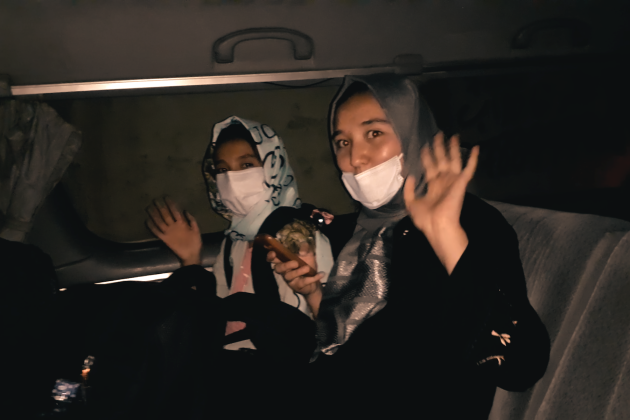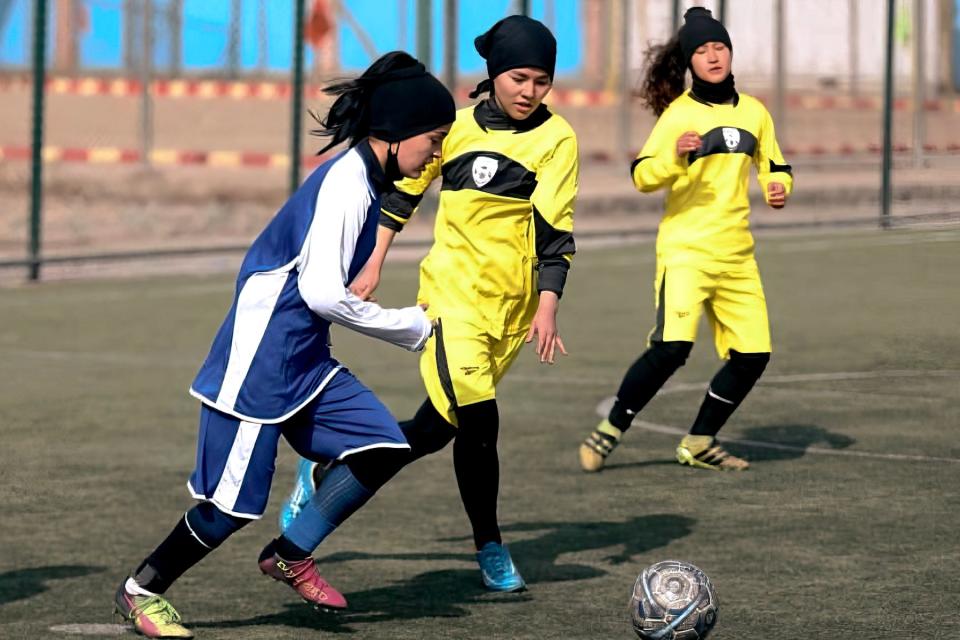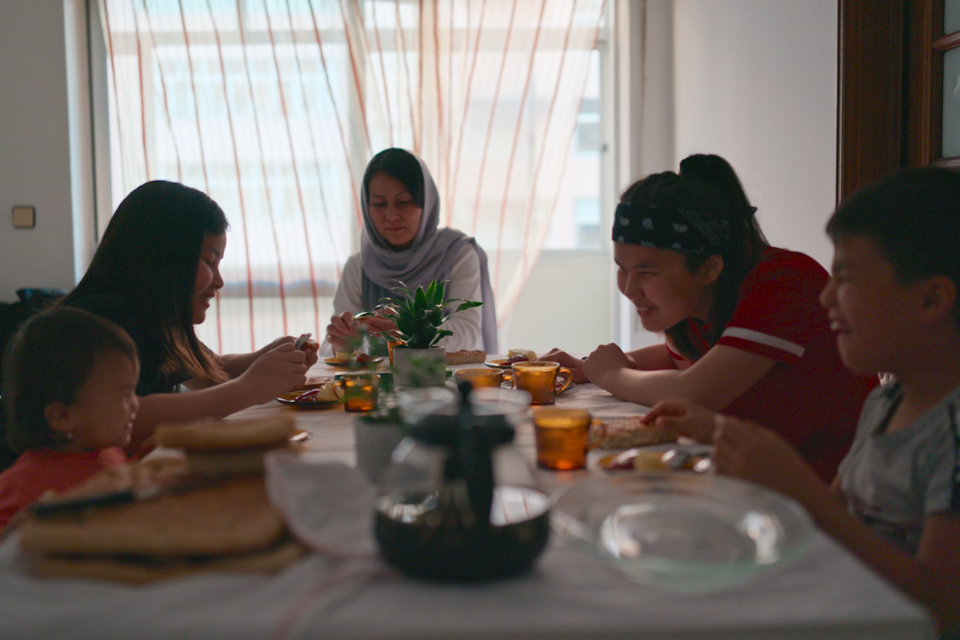The Afghanistan Girls Soccer Team’s Daring Escape From the Taliban

I think the thing I love most about sports is that under the right set of unpredictable and unlikely circumstances, they can give you that ineffable feeling that anything is possible. Watching the Women’s World Cup this summer, I got that feeling a few times. First, there was the night when Nigeria beat host-nation Australia in the second match of group play. Then it came again when Colombia stunned Germany, knocking the world-ranked number two out of the tournament. I felt it too when I watched my beloved USWNT’s hopes kept alive by the width of a goal post one game — only to be reminded how fleeting the feeling was when those hopes were destroyed by a millimeter in their next match.
But never have I been more powerfully convinced that anything is possible in sports than a day in the fall of 2021, when I watched the under-18 Afghanistan girls soccer team take the field for a scrimmage in Lisbon, Portugal. Only a few days earlier, they’d arrived from their country after fleeing from the brutally oppressive Taliban regime. Now, here they were playing a game of soccer. How about that for a tribute to possibility?
More from Rolling Stone
The Fugitive Nissan CEO Smuggled Out of Japan in a Music Box
Prince Andrew's Jeffrey Epstein Ties Explored in 'Secrets of Prince Andrew'
'San Francisco Sounds' Reveals the Discovery of Janis Joplin
Their journey had begun over a month prior, on August 15, 2021 — the day the Taliban waltzed into Afghanistan’s capital city of Kabul and quickly seized control of the country. Knowing its players’ lives were at risk under Taliban laws that would not only preclude women from playing sports, but effectively erase them from public life entirely, the Afghanistan Football Federation put out a desperate plea across the globe for help. They reached out to the senior women’s national team captain, a young woman named Farkhunda Muhtaj who was living in Toronto. Farkhunda eventually got herself connected with some Americans who had been working on evacuation efforts for weeks. They devised a plan, secured funding, and began orchestrating the girls’ escape. A few trying weeks followed, including some near-miss encounters with the Taliban, and a 20-day stay at a safehouse in Mazar-i-Sharif. But on September 19, more than a month after the ordeal began, the girls arrived in Lisbon. The Portuguese government had agreed to grant the players and their families asylum, and give them a chance to rebuild their lives there.
That’s when I met them, as one of a group of observers who’d flocked to Lisbon on that fall afternoon to watch the team play and hear their story. The teenage girls, some of the most talented young soccer players in Afghanistan, were playing against a Portuguese youth club. The level of play was not equal across the two sides — the Portugal squad moved the ball around swiftly and with precision, individual players showing glimpses of brilliance and creativity that the Afghanistan side couldn’t match. But watching the relentless effort by the Afghan girls — sprinting to every loose ball, cheering for each connected pass and tackle won — it was clear how much playing the game of football meant to them.
And when you think about it, of course the game is important to them. They’d risked their lives and left everything behind just to keep playing it. They lost the game that afternoon, but it didn’t matter. The fact that these young women were on the pitch at all was a victory to be celebrated.

I ended up spending the better part of the next two years working on a film about the team’s evacuation from Afghanistan. Its title is Ayenda, the Farsi word for future and a nod to the team’s self-given team name, Ayenda FC. Using voice memos, photographs, and videos from Farkhunda and the players, Ayenda pieces together their journey out of Afghanistan, and gives a glimpse into their new lives in Portugal. During those first few months in Lisbon, each hopeful moment was balanced uneasily by overwhelming uncertainty for what lies ahead, and profound sadness for what they’d left behind. Among thoughts of the family members, friends, homes, and memories they’d left behind was the dream of representing Afghanistan on a football field.
The truth is, though, it was only relatively recently that any woman anywhere had gained the right to realize the dream of representing her country on the pitch.Football has long been considered the world’s game. But for the most part, that’s only been true for men. The first Women’s World Cup took place just over thirty years ago, in 1991 — over sixty years after the men’s tournament began. Of the 12 teams in the inaugural women’s world championship, England, a 2023 finalist, was not one of them. The game in England was still recovering after a 50-year ban on women playing was lifted in 1970.

This year, the Women’s World Cup consisted of 32 teams — the largest field of competitors ever. It was a testament to the growth of the women’s game, and the increased support football federations around the world are showing their women’s programs. And the tournament debutants showed up to play, proving that they deserve to be there. Portugal tied the U.S. powerhouse, the Philippines beat the New Zealand hosts, and Morocco, the first women’s team from a majority Arab nation to play in the tournament, emerged from the group stage with two wins — enough to get them into the knockout round.
I know it’s hard to imagine under the current circumstances in Afghanistan, but if you watched Ayenda FC play that day on that perfectly groomed grass field in Lisbon — an undeniably hard-to-predict circumstance — you might believe in the idea that someday there will be an Afghan team participating in the Women’s World Cup. Unlikely? Perhaps. But with the promise and perseverance this youth team has shown, and the magic of sports, it seems to me that anything is possible.
MSNBC Films presents Ayenda, the latest installment of the documentary series “The Turning Point.” Premieres Sunday, August 27, at 10 p.m. ET on MSNBC & streaming on Peacock. Ayenda is a production from MSNBC Films, TIME Studios, Day Zero Productions, Sugar23, Mainstay, P&G studios, and Words + Pictures.
Best of Rolling Stone

